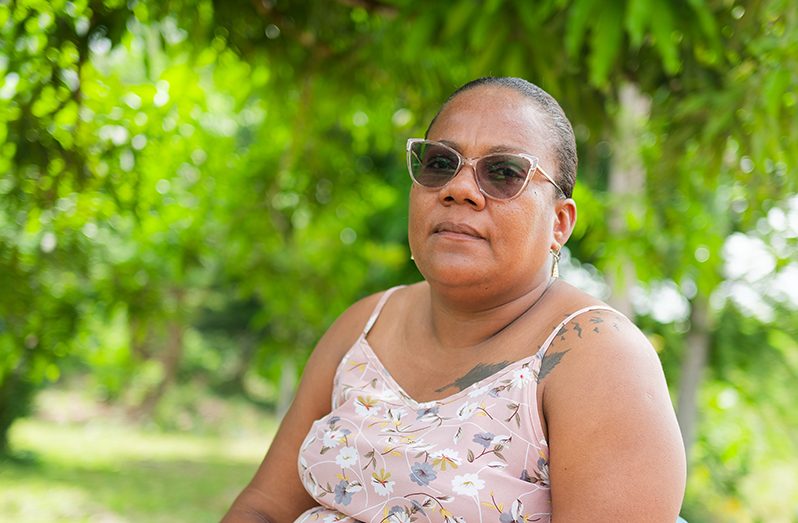How women are making their mark in the logging industry
LINDEN and much of Region 10 is synonymous with mining and logging. For surrounding communities, logging is one of the most viable options for work miles outside the capital city. But logging is dangerous, strenuous work. With long hours of physical labour coupled with the constant threat of falling trees, the job is undoubtedly on the riskier side of business. This is perhaps why women are not often pictured in the field. However, amidst other changes, women are becoming more involved in the logging industry. Although they may face different challenges, the women participating in logging find solutions. Nola Lamazon of Three Friends is one of these industrious and certainly ambitious women who seek to make their mark in the field.
Early life in the community
For most people, the community of Three Friends is simply a mark along the way, and it may sometimes get lost and blended into the background with surrounding areas. Those who call the community home, however, have a different take on the atmosphere of the village. Lifelong villagers like Nola describe the community as uniquely peaceful. Her early life in Three Friends was modest and was characterised by the little work her father did in the then-vibrant bauxite industry the area has become known for.
Although challenges were present, the tough times were interwoven with great childhood memories of being immersed in the community’s natural beauty. As Nola shared, “Growing up in this community was a great privilege. Because at least you get to explore the community. Now, the children just be inside with phones and gadgets and so on.” Her family’s early adversities taught Nola countless lessons about the value of hard work, many of which came from her mother later on. As she recounted, “It was hard at first. My parents, my father, he worked, he worked in a bauxite company and at that time, you know, it was not much. My mother, she stayed at home until she became a community health worker which gave us a little more boost in life.”
Life in and out of Three Friends
As she continued to strive, Nola eventually left her home in Three Friends. Long before joining the logging industry, she was a mother. For many years she sought work outside of the community and even lived in the capital city at one point in time. “I moved to Georgetown, where I met my children’s father. I gave birth to two children, Stephanie and Tiffany,” she explained. She later returned to her village after spending several years away. Although much had changed, the village’s quiet, serene nature remained the same. “In Three Friends, it’s peace and quiet. In Georgetown, it’s a busy life,” she shared.
As much as the community’s peacefulness is valued, the serenity does come at a cost. Drawing a comparison between her journey and time in Georgetown, Nola explained that acquiring certain items proved challenging in Three Friends. This is in stark contrast to Georgetown, where there is always a store around the corner. She stated, “You would find that in Georgetown, for me, at some point, things were easier when it comes to meeting the daily necessities and so on when it comes to this community. Sometimes it could be challenging when you need something and you cannot get it. You find persons who are farming, but not on a very large scale.”
Women in logging
The logging field, with its chainsaws and hauling tons of timber, is not often a field in which women are pictured. Nola admits that initially, she did not set out to be a part of logging but rather turned to the field out of necessity. Upon returning to her village as a mother, Nola was faced with a new set of financial struggles that sought to threaten her family. She took up several jobs over the years, but the most challenging mantle has certainly been logging. She stated that she joined in hopes of creating a better life for her family. “I got into logging just to gain a better life because, at first, there wasn’t anything to do. So, this logging concession was formed by a youth group. And, as a youth at the time, I got involved. Honestly, when it started, I was not involved.”
But she is definitely involved today. Nola is among a small number of women in the logging industry. Having been in the field for more than 15 years, Nola explained the arduous process required for lawful logging. “I have to apply for a concession through some kind of forestry commission. And we have 25 members, and you basically get tracking tags from forestry. You go, you cut your wood, you tag and sell off and so on.” The major difficulties arise in the area of physical labour.
According to Nola, men have an advantage in logging. As men venture out themselves to harvest lumber through the forests of Region 10; women are forced to entrust men with their work. She elaborated on the matter, adding, “As a woman in the logging industry, it could be challenging because if you’re a man, you would go and cut your wood yourself. A woman, you gotta employ somebody. So that brings challenges because, the men would gain more because they would go and cut themselves. For the women, you have to find everything. You have to employ somebody. And then it doesn’t give you the assurance that they would cut something good for you.”
Challenges in the industry and at home
The industry is facing its fair share of challenges as well. With the effects of climate change being felt far and wide, Guyana is making efforts and strides to protect our natural diversity, and our forests are of particular interest. The Guyana Forestry Commission has set out to diversify the logging industry, with decreased logging in certain areas. However, this is not done to make loggers out of a job. However, the commission and loggers are working tirelessly to find more sustainable alternatives.
As Nola explained, “Forestry is trying to do away with this kind of logging right now because, uh, this climate change and people cutting down trees and so on. They’re trying to move away so persons could find other things to do, like coal burning. Like, you know, you’re going to find the other, the pieces of wood that are there. Or do some farming, this hemp program they’re trying to get you involved in and so on.”
The loggers and the community at large look forward to introducing new sectors, with tourism being in the spectrum of areas to be developed. Three Friends has benefited and blossomed over the years in the sphere of community improvement. The community has grown over the last few years, as living in the community becomes more comfortable. “We have more persons moving within the community, moving into the community. Health services are more improved. Communication, because we got internet.” Villagers like Nola are optimistic about the trajectory of the community’s development. They are hopeful that positive steps are being taken towards uplifting the captivating haven that is their community.




.png)









